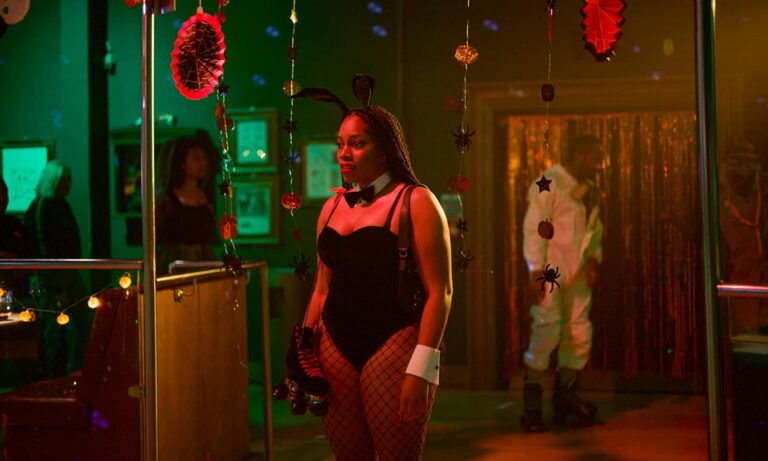Channel 4’s Queenie is a love letter to messy Black women in their quarter-life crisis
When Candice Carty-Williams’ debut novel Queenie was released in 2022, most Gen Zers were between the ages of 7 and 22 and probably didn’t quite relate to the quarter-life crisis of lonely South Londoner Queenie Jenkins that was being explored within the book’s 330 pages. However, five years on, a much-anticipated TV show has premiered, just as the oldest Zoomers are experiencing the existential dread that comes with being in your mid to late 20s.
SCREENSHOT was blessed enough to attend the premiere of Queenie, which also consisted of a question and answer (Q&A) session with the author and the series’ lead actresses Dionne Brown and Bellah. Here’s our take on the new Channel 4 sitcom and why Queenie is the much-needed antidote to quarter-life-induced stress, anxiety, and isolation.
The first episode starts us off with Queenie in stirrups, covered mostly by a paper towel during an examination by her gynaecologist. Her inner monologue is funny, sharp and biting as the show introduces us to a 25-year-old British Jamaican writer awkwardly navigating worlds.
As our queen returns to her job as an assistant at a news publication, she does so to the side-eye of her uptight boss, who spends the remaining afternoon shooting down her pitches about racism and Black British life. Sigh.
The turmoil in Queenie’s life reaches a boiling point after a dinner of microaggressions at her white boyfriend Tom’s family home. And instead of siding with her, Tom slaps Queenie with an unwanted breakup, forcing her to move out of their shared home. Ouch.
So it’s back to her grandparents’ house until she finds a new place to stay.
Considering the challenges of taking on a character that people love so much, lead actress Dionne Brown replied: “Just reading the book, it was a bit of a no-brainer to see how it had impacted so many people, women, Black women, women from London. I was putting a lot of pressure on myself initially because I didn’t want to let people down. I wanted to tick all the boxes, every single box that there was I was like, I’m going to tick them all.”
She went on to add: “But I can only do my best, do my job and go home. So at some point, I had to relinquish the idea of control that I had in my head. I needed to be a bit more present than I was and stop thinking about what other people might think.”
Similar to The Summer I Turned Pretty author Jenny Han, Carty-Williams was the showrunner and executive producer of the series. The writer guaranteed that the TV version would be a close adoption of the book and guided the actors who were bringing her characters to life.
When Carty-Williams cast Bellah as Queenie’s best friend Kyazike Mayagenda, she also made sure to utilise the singer and actress to her full potential.
“So you’ll hear my voice at the end of the series. Very excited. I’m very honoured. Thank you very much, Candice,” Bellah said in reference to one of her songs appearing at the end of the show. “It was really special that Candice was like ‘I’m casting you in this role but I also know who you are. And I’m going to utilise your talents.’ I was very honoured.”
As the show progresses over eight episodes, it begins to explore darker themes such as miscarriage, domestic violence, and the traps and pitfalls of hook-up culture, always against the vibrant backdrop of South London.
Queenie is really just a love letter to Brixton with its busy high street, geezers, chicken shops, and rooftops on old industrial buildings that overlook the city of London. Within it, cultures meet and identities collide to form a mecca of diverse people and human experiences.
At the same time, Queenie is a celebration of black women and an invitation to not let their healing and relationship to themselves be dictated by other people.
Black women aren’t strong (at least not always), they’re human. Yet, they’re forced to put on a facade of strength and functionality because the world around them would chip away at their sanity otherwise.
“I’ve said it 500 times, it is okay to be messy. It’s okay to love yourself in all seasons. It’s formative and bad choices make better stories,” Brown noted. “Still, not every single choice, some here and there,” she said laughing.
Bellah agreed: “It’s very okay to be messy. Make sure you don’t take yourself too seriously. It’s never, ever that deep. When you look back, you’re like, ‘Oh, I was crying. But why?’ Do you get it? Especially stepping into this role, I want everyone to know that they are capable. You’re more than what you set out to be. And just allow yourself to step into those opportunities when they are presented.”
Queenie is now streaming on Channel 4 and Now TV. And trust us, it’s worth a watch.






